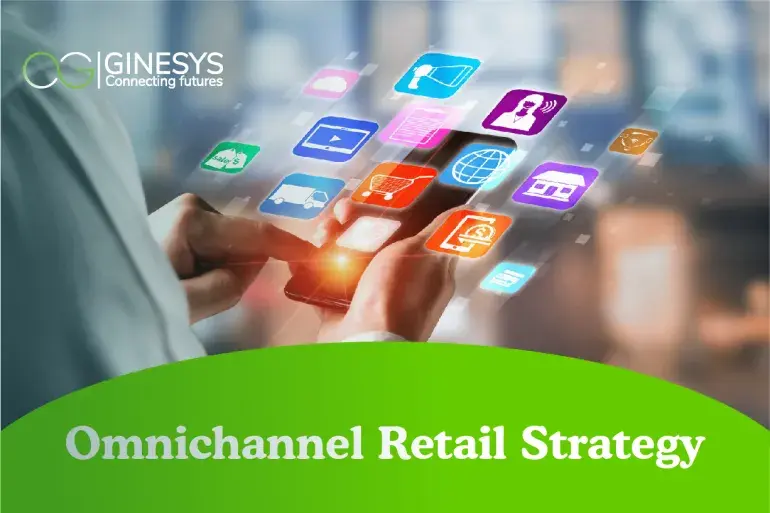Omnichannel retail success factors
Omnichannel retail success factors
Transacting through multiple channels, such as shopping online, through mobile apps, social media, and brick-and-mortar stores is referred to as omnichannel retailing. The term "omnichannel" has become a buzzword, but it isn't just another way of stating "I sell across online and offline channels." Let's take a look at the nuanced distinctions between omnichannel and multichannel commerce first and then jump into details about everything related to an Omnichannel marketing strategy.
Omnichannel retailing
A true omni channel retail strategy must deliver a consistent customer experience everywhere you sell to provide what customers expect. A customer journey should build relationships that transcend channels. It also needs to emphasise optimising your business through channel diversification and comprehensive integration of your systems and data.
Multi-channel retailing
Multi-channel commerce, like omnichannel, refers to selling over numerous channels. Multi-channel experiences, on the other hand, are frequently inconsistent, owing to siloed marketing efforts that lack a clear cross-channel message which, in turn, affects customer satisfaction. Rather than optimising the multi-channel experience, it focuses on optimising multiple touchpoints.
Why marketing across multiple channels is important
The speed with which consumer behaviour is changing in 2020 has made it more crucial than ever to ensure omni channel experiences. Single channel and multi-channel retail are slowly fading away. Moreover, many retailers stated they planned to boost their investment in omnichannel commerce in the future, compared to their plans before COVID-19.
An omnichannel approach can aid in the growth of sales and revenue. Faster digital experiences, curbside pickup, and touchless check-out improved shopping frequency and incremental revenues are some of the reasons why omnichannel is so valuable.
Meet customers where they are: Customer journeys used to be very linear, but they are no longer so. Innovative brands and items are being discovered in a variety of new ways, including Facebook and Instagram ads, Google Shopping, Amazon and other marketplaces, product reviews, in-store discovery, word of mouth, and more. They can come across your brand on a computer, television, or mobile device.
Stand out in a crowded field: With more businesses competing for online attention, sticking out requires a more resonant brand, a better shopping experience, and excellent customer service. To do so, you'll need to adjust to changing consumer requirements and habits, as well as re-calibrate your understanding of your target market.

Data and analytics can help you improve your business: Some merchants may need to adapt their sales and marketing channel mix to optimise for the new reality, given the fast and abrupt change in consumer behaviour. Understanding your customer data will assist you in determining where and how to concentrate your efforts. This Data will need to be collected from both the physical store as well as the online store.
How to ensure a good omnichannel experience
To build the ideal omnichannel customer experience, start with a thorough understanding of your customer. Understanding your clients on a deeper level entails paying attention to the online channels they use to shop, their purchase habits, the issues they confront when shopping, how they connect with the brand at each touchpoint, and the devices they use to shop.
This information will assist you in identifying the appropriate touchpoints and focusing on strengthening and connecting them in order to provide a seamless and customised experience for your customers. It will also enable you to identify common client issues and develop a feasible solution for them.
Here’s how to build an omnichannel strategy
Focus on customer experience
Learn about their channels and how they behave across them all and make a clear plan for how you want the experience to flow across all touchpoints. Use data as a foundation for strategizing. Using CRM data, social listening data, and consumer internet search behaviour, you'll be able to understand how your customers behave and, as a result, design a solution to address their problems. By utilising data effectively, you may even cut churn.
Segment users and personalize their journey
After analysing the data, you can quickly categorise users into different groups based on similar behaviours. This will help you in creating unique customer journeys for each type of consumer.
Nail the context the first time around
The context is one of the vital aspects of an omnichannel marketing approach. Your users will be discouraged from engaging with you if you send the wrong message to the wrong audience at the wrong time. Ensure your message's context is understandable to the user, and deliver it to them at an instance when they are most engaged and on the channel which they use the most.
Choose the best marketing automation software

From the moment your strategy is conceived to the moment it is implemented, use the correct marketing tools. Before deciding on the best software, conduct comprehensive research to find the one that meets your needs.
Make your company more customer-focused
This is a critical stage because no plan or marketing tool can work unless your personnel are taught to provide a consistent experience to clients.
Creating precise financial reports
To avoid conflicts, every organisation should compare inventory stock to accounting data. Not only are accurate financial statements crucial for tax purposes, but they are also important for key stakeholders and investors. If there are significant inconsistencies on a regular basis, the fundamental reasons should be examined. Integrating your inventory management system's transactions with your back-office accounting system will help you avoid problems, errors, and delays.
Integrated inventory management is essential for an omnichannel strategy
For many successful business owners who understand the need of proper inventory management, inventory management software has become an invaluable tool. Accounting software, on the other hand, is essential for even small organisations, as it provides crucial data on business performance. Inventory management software, as well as accounting software, are essential for every organisation of any size to increase efficiency and organise operations effectively.
Accounting software determines your company's current financial status, while inventory management software keeps your goods in good shape. Knowing what you have in your warehouse and where your merchandise is stored is the goal of inventory management. An inventory management system, on the other hand, can't properly optimise your inventory unless it's coupled with your back-office systems. Here are some advantages of it.
Avoid stockouts and waste
Maintaining client happiness and avoiding wastage are both aided by optimising inventory inventories. Every inventory item has a cost associated with it in terms of storage and management. As a result of accumulating surplus inventory stock, unsold things will linger on shelves, which is a cost in and of itself, and even more so if items become damaged or outdated.
Reduce labour costs
Labour expenditures account for a major portion of a company's budget. When inventory management and accounting software are integrated, the likelihood of labor-intensive manual feeding of components that are related to one another is decreased.
Improved automation
Integrating two of your company's most important software applications into a single platform streamlines procedures, and real-time data enhances automation in the workplace. The output from the integrated programme can be used to make key decisions.
Boost your omnichannel retail strategy with Ginesys
As you can see, omnichannel retailing is the only way forward if you want your business to prosper. However, even the best of the best organisations struggle without the help of software to manage multiple channels. Ginesys’s proprietary tools including ERP, POS and OMS are your solution to handle omnichannel retailing with ease and reap its benefits. Get in touch with us to learn more.

